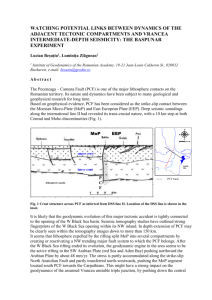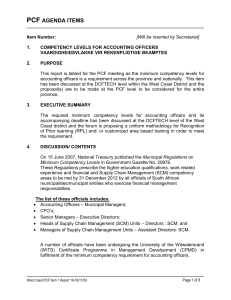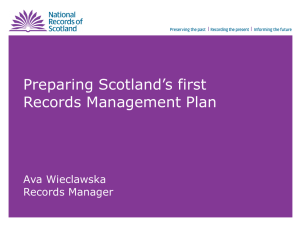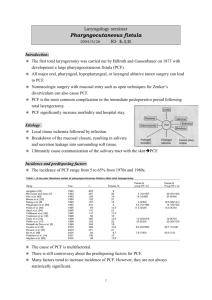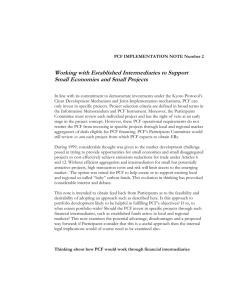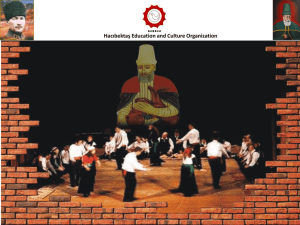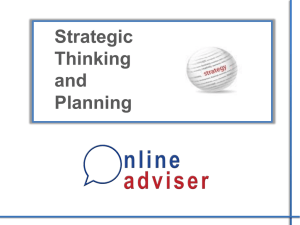Project - Stiftung Kinderdorf Pestalozzi
advertisement
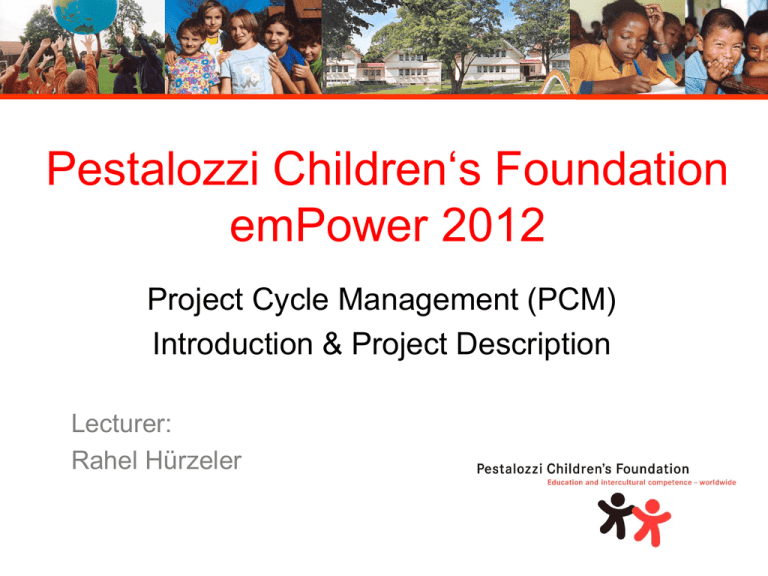
Pestalozzi Children‘s Foundation emPower 2012 Project Cycle Management (PCM) Introduction & Project Description Lecturer: Rahel Hürzeler Programme Thursday, August 16, 2nd day Review of yesterday by the students Objectives of the day Terminology Project Cycle Management (PCM) Importance of selection criteria and policy frames Group Work: Plan a leisure time activity with the project cycle Terminology PCM Exchange of Experience “Effect of Projects” Introduction of the PCF template “Project Description” Objectives of the Day PCM module: Introduction & Project Description You are familiar with the terminology of PCM You reflect the role of criteria and policy frames in PCM You are able to plan a “mini project” along the project cycle You understand the content and utilisation of the PCF template “Project Description” You are able to summarise a project Terminology of Project Cycle Management (PCM) Groups: 4-5 people Time: 5 minutes individual work, 10 minutes group work Write down your own definition (5’) and elaborate a common understanding (10’): 1.Group: Definition of Project 2. Group: Definition of Programme 3. Group: Definition of Project Cycle Management Terminology of Project Cycle Management (PCM) Project: Complex one time venture with a beginning and an end for the achievement of concretely defined goals with given resources (human, financial, time). Programme: A programme consists of different project with a common aim. The coordination of the different project activities creates a value added. Project Cycle Management: A management process that takes place for the entire duration of a project, consisting analysis, identification, planning, implementation, monitoring and evaluation, in order to improve the quality and effectiveness of the project. Why do we need clear criteria and policy frames? Policy is a set of main aims and value systems Criteria are needed to objectively measure the realisation of the policy framework and to focus on a specific field of intervention Examples: PCF criteria for country & regions PCF criteria for projects PCF selection criteria for emPower students Individual reflection about the project criteria in your organisation → Are the criteria put down in writing or implicit? → Write down the similarities and differences of the project criteria in your organisation and the PCF project criteria Group Work: Application of Project Cycle Groups of 3-4 people, 20 min. preparation, 5 min. presentation Plan a leisure time activity for all emPower students, write each step of the project cycle (Situation Analysis, Identification, Project Planning, Project Implementation, Project Monitoring, Project Evaluation) on slips of paper. Make a 5 min. presentation about these steps and the challenges of the planning process. Terminology PCM Understanding the terms efficiency, effectiveness and relevance We can be very efficient, but not effective! We can be very effective, but not relevant! To do the things the right way is very important (efficiency). But to do the right things is even more important (effectiveness)! Example: Crossing the lake of Constance, Igloos in Africa Efficiency, Effectiveness and Relevance in your Context “Exchange of Experience” Stiftung Kinderdorf Pestalozzi 10 Effectiveness The extent to which the development intervention’s objectives were achieved. Efficiency A measure of how economically resources/inputs (funds, expertise, time, etc.) are converted to results. Relevance The extent to which the objectives of a development intervention are consistent with caps in human rights, participants’ requirements, country needs, global priorities and partners’ and donors’ policies. “Exchange of Experience” Tell each other one positive and one negative experience with efficiency, effectiveness and relevance in your context Stiftung Kinderdorf Pestalozzi 12 “PCF project planning documents” http://www.pestalozzi.ch/partnerforum Stiftung Kinderdorf Pestalozzi 13 PCF project planning documents http://www.pestalozzi.ch/partnerforum Stiftung Kinderdorf Pestalozzi 14 Stiftung Kinderdorf Pestalozzi 15 Project Description 1. Profile 2. Summary 3. Context 4. Project history 5. Levels of intervention 6. Project Participants 7. Project Structure 8. Project Planning 9. Quality Assurance 10. Project Sustainability 11. Project Ressources 12. Co-ordination and Networking Annex: Project Planning Documents Stiftung Kinderdorf Pestalozzi 16 Brainstorming: Make a summary of your Project What information has to be included in the summary (chapter 2 of the project description) for your project? Make a short outline with the most important information (10-15 keywords) about your project. Stiftung Kinderdorf Pestalozzi 17 Practial Example: Hibret Project, Ethiopia Read the Profile & Summary from the Ethiopian Project Home Work Please bring with you the project documentation (printed version) of a project which is implemented by your organisation and supported by PCF. For tomorrow the Project Description with the Chapter Context / Situation Analysis and for Monday the Logframe and the Action Plan. Stiftung Kinderdorf Pestalozzi 19 BACKUP PCF Criteria Country & Regions PCF Criteria Project Selection emPower selection criteria for partner organisations and students 1. Selection criteria for partner organisations Cooperation with PCF The organisation wishing to send an emPower student should be (or plan) to be an operational or strategic partner (local or international) of the PCF country programmes. Interest of partner organisation The organisation should be interested in the same thematic issues as PCF (such as basic education, intercultural education and child rights). Responsibilities of partner organisation The partner organisation commits itself to bear the responsibilities specified in the letter of intent. 2. Selection criteria for students Candidates wishing to participate in the emPower training course should send a personal application to one of the partner organisations of PCF. Cooperation with partner organisation The candidates already cooperate or plan to cooperate with the respective organisation. Previous education and training Applicants should preferably have a bachelor degree in any field or any other comparable education enabling them to follow a demanding training course in English. Age Applicants have to be between 22 and 28 years of age. Language Good written and oral command of English is required. Minimal requirements are defined in a specific test that will be organised and conducted by PCF for eligible candidates during the selection process. Interest and motivation Applicants have to be motivated and show keen interest in social professions and intercultural issues. They have to be willing and have the necessary time to work as agents of change in their country of origin after finishing the emPower course in Switzerland. Competencies Applicants are required to have good social skills, to be open to live and to work together with people from different cultures, to be ready to critically reflect their own culture, to be personally mature and responsible. Candidates wishing to participate in the emPower training course have to agree with the attached code of conduct. Breaking the code of conduct results in expulsion from the course.


